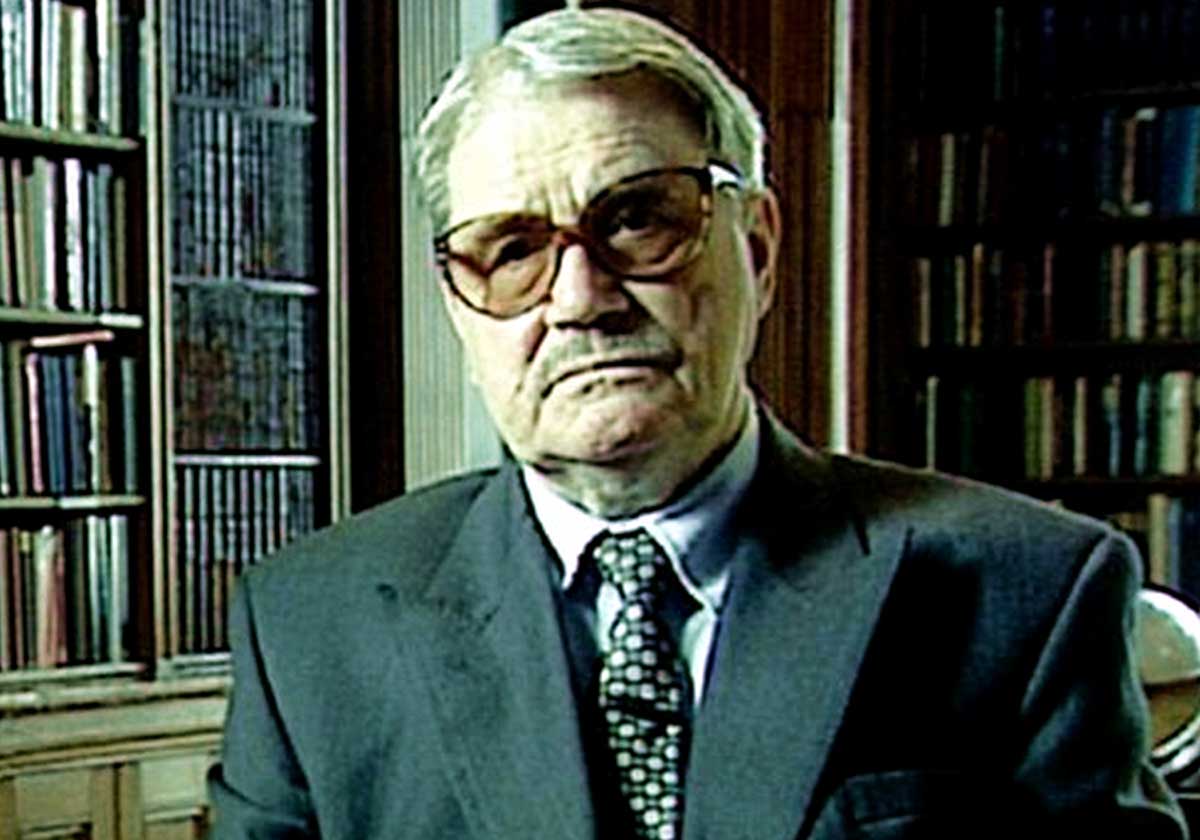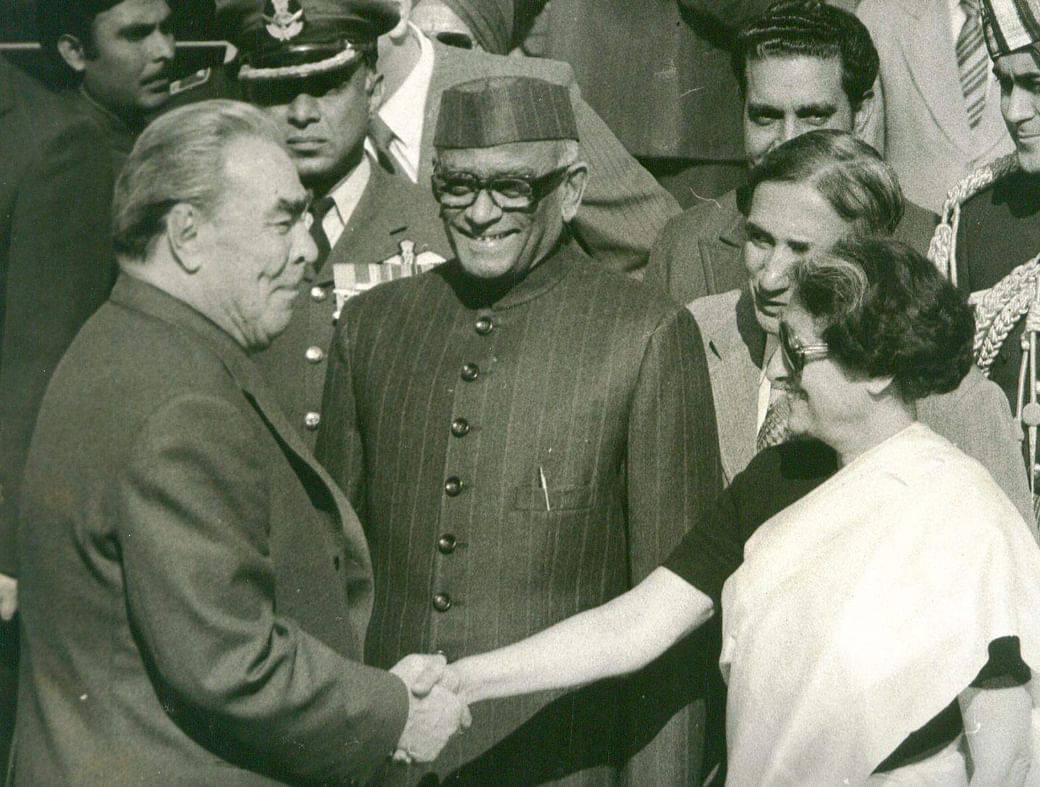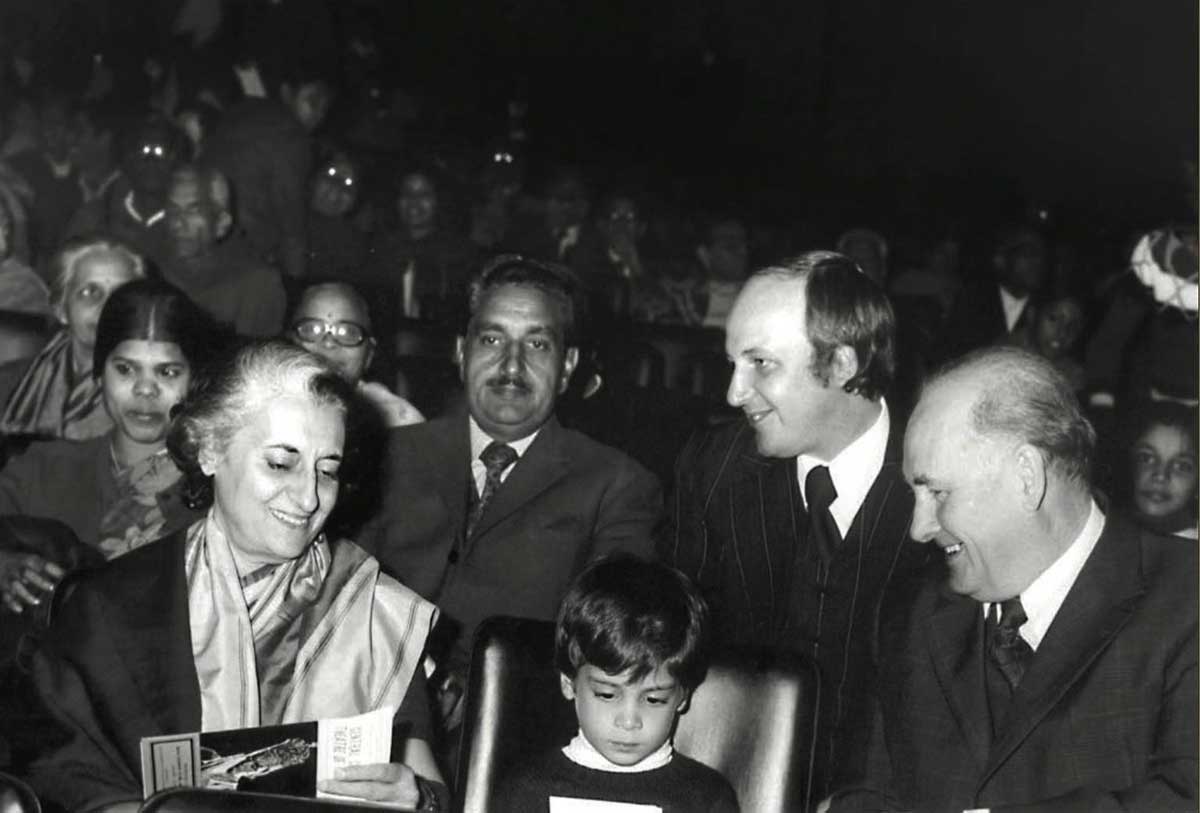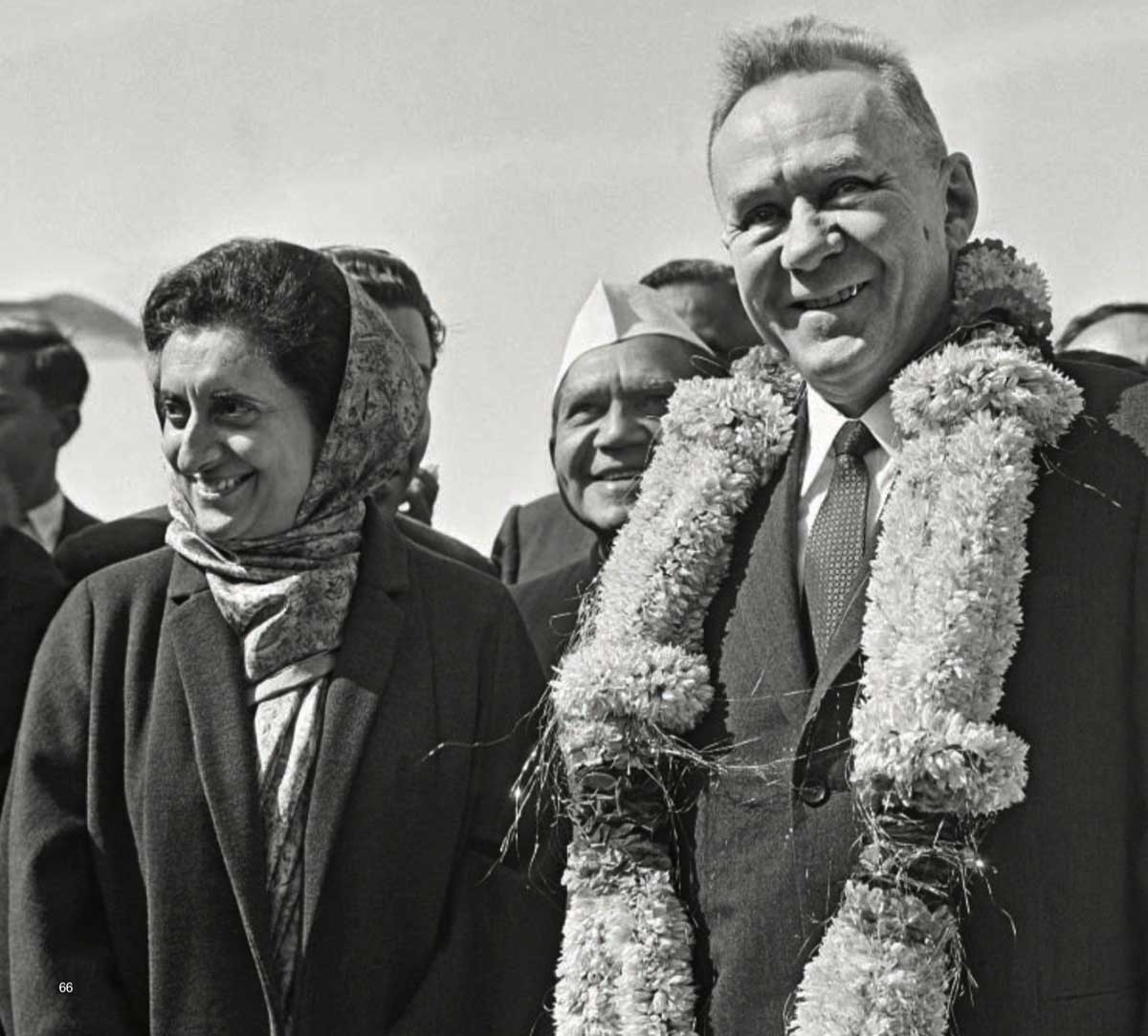Sanatan Articles
Satyaagrah
Written on
Satyaagrah
Written on
Satyaagrah
Written on
Satyaagrah
Written on
Satyaagrah
Written on
JOIN SATYAAGRAH SOCIAL MEDIA
Was Indira Gandhi a Soviet Agent - 100 Years of Russian Revolution

In 2005, an otherwise dry academic book called The Mitrokhin Archive, about the activities of the KGB in Third World countries, created an unlikely political uproar in India. One might wonder what could have possibly piqued the interest of an ordinary Indian politician in the activities of the secret agency of a faraway country of a bygone era. The answer is very interesting.
The book claimed that many of the top leaders, diplomats and statesmen of Congress were working as the agents of the KGB, the Soviet secret service. The rot was deep and politicians very high up in the ladder in the Congress Party were directly passing secrets of India’s activities to the Soviet Union. The book claimed that even the personal office of the then Prime Minister of India, Indira Gandhi, was deeply compromised and infiltrated by the Soviet secret agency. The Indian secret operations, in other words, were an open book for the communists in the Soviet Union. They were in a position to manipulate India at will.
A few newspapers like The Hindu published reports about the uproar and the book, summarizing its contents in pithy lines. The Congress politicians dismissed the charges in righteous indignation. The contemptuous outrage they showed at the charges, without any effort to explain them away, tallied with their customary behavior whenever facing criticism on the grounds of compromising national security.
In 2005, the UPA-1 had just come to power. The government was drunk on its ‘success’ in the 2004 elections. The left-leaning Indian media, the hand maiden of the Congress Party was all too happy to brush under the carpet any news portraying the Congress Party and its most hallowed totem, the Gandhi family, in bad light. Soon the issue was hushed up and Indians promptly forgot all about it.
 Vasili Mitrokhin |
The charges in the book, however, were extremely serious. That even the highest echelons of government and other institutions were compromised and that Indian foreign policy was an open book for half of the world to see is something which should put even a banana republic to shame, let alone the largest democracy in the world. It is a charge which deserves to be examined again. Who was Mitrokhin and what is the Mitrokhin archive?
Vasili Mitrokhin was a senior archivist in the Foreign Intelligence department of the Directorate of the KGB. His job, in the pre-internet era was to archive the secret reports. He was a low level officer in the department and was usually kept out of important meetings of the secret agency, but due to his special assignment of archiving records he was privy to the dirtiest secrets of the Soviet Union, the KGB and their activities all over the world.
Being a man of conscience, a rarity in a harsh and punishing regime like Soviet Union, Mitrokhin thought of duplicating the archives for himself. Mitrokhin ‘spent over a decade making notes and transcripts of these highly classified files which, at enormous personal risk, he smuggled daily out of the archives and kept beneath its dacha floor.’[1] Like Solzhenitsyn, he had a premonition that someday he would able to tell the world about the nefarious activities of the communist country which claimed to be the Heaven on Earth.
In 1992, after the fall of the Soviet Union, Mitrokhin migrated to the United Kingdom and handed over the archives to the competent authorities. In 1999, the first volume of The Mitrokhin Archive was published with the renowned historian Christopher Andrew focusing on the activities of the KGB in the West. In the second volume, KGB’s activities in the Third World were covered. One of the most important chapters of this book was the one concerning with KGB’s activities in India.
The authenticity of the Mitrokhin archive has been proven, as hundreds of its stories about the secret agents of the KGB across the world have been independently corroborated. What then did the Mitrokhin archive say so bad about the Congress Party and Indian government that it had to be hushed up in angry sermons?
 PM Indira Gandhi and President Sanjeeva Reddy (centre) with Russian President Leonid Brezhnev |
It is no secret that India’s first Prime Minister, Jawaharlal Nehru was a closet communist and declared his sympathies for socialism and the Soviet Union whenever the occasions came. Nehru ‘had no doubt that the Soviet revolution had advanced human society by a great leap and had lit a bright flame which could not be smothered.’ [Mitrokhin, 312]
This is not a place to discuss the atrocities of the communists in the Soviet Union, but suffice it to say that the Soviet Union built the greatest array of concentration camps known in the history of human kind and killed more people than the Nazis killed in the Second World War. Even then, the Congress Party led by Nehru was in thralls with the Soviet Union.
The KGB had perfected the art of infiltrating government institutions and India was a cake walk by their standards. “Neither Nehru nor the IB realized how thoroughly the Indian embassy in Moscow was being penetrated by the KGB, using its usual varieties of the honey trap.” [Mitrokhin, 313]
Krishna Menon, the ultra leftist friend and advisor of Nehru was a prime target of the KGB for recruitment as a KGB agent. The KGB residency in New Delhi was authorized in 1962 to strengthen Menon’s position in India and try to enhance his public image. One of the primary ways of supporting Menon like would-be recruits was to fund newspapers. A large section of Indian media even in those days was quite willing to play to the Soviet tune for a certain price. [Mitrokhin, 315]
The KGB was apparently grooming Menon for being the successor of Nehru. Menon, it clearly looks like, played by the Soviet tune. Many pro-Soviet diplomatic and defense decisions were taken during his tenure. However the Indo-China war of 1962 seriously dented the reputation of Nehru and most of all Menon; consequently he fell from grace. The KGB had to find another way to infiltrate Indian government and influence policy decisions.
In 1966, Indira Gandhi became the Prime Minister of India. The KGB had been trying to influence Indira Gandhi from 1953 when she visited Soviet Union. Christopher Andrew writes: “As well as keeping her under continuous surveillance, the Second Chief Directorate also surrounded her with handsome, attentive male admirers.” [Mitrokhin, 316] The attention showered on her made obvious impression and she had a very good image of Soviet planning and economic model. The KGB did not just limit its activities to recruiting prominent Indian politicians. It also tried to influence the outcome of elections by financing communist or pro-Soviet candidates.
 Mrs Indira Gandhi and her grandson Rahul with Ambassador Viktor Maltsev at the “Ramayana” performance of by visiting Soviet artists. New Delhi, 1976 |
“After the elections of February 1967, the KGB claimed… that it was able to influence 30 to 40 percent of the new parliament.” [Mitrokhin, 318]
As a result, the new cabinet under Indira Gandhi was more pro-Soviet, pro-Communist than any before. Meanwhile Indira Gandhi, in order to increase her clout within the party, was planning for a split which would oust the Congress stalwarts who opposed her. This is when she decided to get the support of the left wing. She nationalized fourteen commercial banks. Many new appointments were made in prominent institutions all over the country and ideological communists and Indira loyalists were cherry picked and air dropped into their new positions.
The communists however did not leave any stone unturned. Not willing to bet everything on Indira Gandhi, the CPI infiltrated Congress Forum for Socialist Action and subverted the party to the Left, from within. The Congress Party had taken an irreversible turn to the Left. The KGB had no small role to play in that.
“The Syndicate hinted that Mrs. Gandhi intended to “sell” India to the Soviet Union and was using her principal private secretary, Parmeshwar Narain Haksar, as a direct link with Moscow and the Soviet embassy.”
Haksar was a protégé of Krishna Menon and was the primary political advisor and aide of Indira Gandhi. That the KGB must have been successful in influencing him if not recruiting him outright, becomes believable from the fact that Haksar went on an unprecedented socialization of the country under Gandhi. Democracy, whatever had remained after Nehru, went out the window under the influence of Haksar in Indira Gandhi’s reign. Soviet communist influence on Haksar and Haksar’s influence on Indira Gandhi became obvious with the infamous secret Treaty of Peace, Friendship and Co-operation. [Mitrokhin, 319]
 |
The influence of the KGB in India in 1970s was steadily increasing under Indira Gandhi’s reign. The illegal residency of the Soviet secret service was upgraded to the status of ‘main residency’ in those years. Directly or indirectly Indira Gandhi was getting influenced by Soviet propaganda and was moving towards increasingly more socialist policies, mostly under the influence of her compromised ministers and advisors.
“In the early 1970s, the KGB presence in India became one of the largest in the world outside the Soviet bloc, Indira Gandhi placed no limit on the number of Soviet diplomats and trade officials, thus allowing the KGB and GRU as many cover positions as they wished- Nor, like many other states, did India object to admitting Soviet intelligence officers who had been expelled by less hospitable regimes.” [Mitrokhin, 321]
In perhaps one of the most shameful of passages describing India, Oleg Kalugin, a high ranking officer KGB officer remembers India as “a model of KGB infiltration of a Third World government… We had scores of sources throughout the Indian government – in intelligence, counter-intelligence, the Defense and Foreign Ministries, and the police.”[2]
Christopher Andrews puts it into one succinct line: “It seemed like the entire country was for sale…” [Mitrokhin, 322]
This ‘selling of the country’ was quickened under Indira’s rule. She herself was as complicit in corruption as the lowest of the Congress cadre. “Suitcases full of banknotes were said to be routinely taken to Prime Minister’s house. Former Syndicate member S. K. Patil is reported to have said that Mrs. Gandhi did not even return the suitcases.” [Mitrokhin, 322]
Indira Gandhi never cared where the money came from. She was just interested in getting more and more for running the Party. Although it is very difficult to believe that she was not at all aware that a large part of this money came from the Soviet Union, from the KGB. The principal fundraiser of the Congress Party, Lalit Narayan Mishra was in cahoots with the KGB and many shady organizations for procuring funds for the Party. In 1975 around the KGB spent around 11 million rubles to build support for Indira. The KGB spies inside Indira Gandhi’s cabinet and in the media also had a role in influencing Indira to declare Emergency.
If the communists were hugely successful in infiltrating the academic and political institutions of India, in the arena of Indian media, they were having a field day. According to the KGB, it had 10 Indian newspapers on its payroll in 1973. In 1975 it planted 5,510 articles in Indian newspapers. ‘Public protests’ were arranged by the KGB on standard price. [Mitrokhin, 325]
 Mr Alexey Kosygin, Chairmam of the USSR Council of Ministers, greeted by Mrs Indira Gandhi, Prime Minister of India, on his arrival to New Delhi, 1968 |
In 1977, despite the efforts of the KGB, Indira Gandhi was defeated. Even after the defeat, the KGB kept up its efforts to revive Indira’s faction of Congress with more communist participation. For this a KGB agent under cover as Trud correspondent got into touch with her. Massive amount of funding was funneled into various fronts floated by Indira’s Congress by the KGB. When Indira returned to power in 1980, she tried to renew her contact with a KGB operative Cherepakhin.
Whether Indira Gandhi was directly a KGB recruit and a Soviet spy is not clear from the available evidence right now and may never be exactly known; but what is clear is that she received funds from dubious sources, floated many fronts for that specific purpose and many of her closest advisors and ministers were either KGB recruits or worked in collusion with them. Regarding the closeness of these Soviet recruits to her it is hard to believe that she did not know that they were foreign spies.
Even though, Indira Gandhi was not directly a Soviet spy, she did not care if the money to run her party came from the KGB. Neither did she care that in return the communists virtually made a coup of the entire nation and occupied every important position in all political, academic, judicial, executive and media institutions of the country.
Like, Christopher Andrews said: “The entire country was up for sale”, and Indira Gandhi sold it to the communists.
REFERENCES
- Andrew, Christopher & Mitrokhin, Vasili. The World Was Going Our Way: The KGB and the Battle for the Third World. Basic Books, 2005. Front Jacket.
- Kalugin, Oleg. Spymaster: My 32 Years in Intelligence and Espionage against the West. Smith Gryphon, 1994. p. 126-7
- indiafacts.org - Pankaj Saxena
 Support Us
Support Us
Satyagraha was born from the heart of our land, with an undying aim to unveil the true essence of Bharat. It seeks to illuminate the hidden tales of our valiant freedom fighters and the rich chronicles that haven't yet sung their complete melody in the mainstream.
While platforms like NDTV and 'The Wire' effortlessly garner funds under the banner of safeguarding democracy, we at Satyagraha walk a different path. Our strength and resonance come from you. In this journey to weave a stronger Bharat, every little contribution amplifies our voice. Let's come together, contribute as you can, and champion the true spirit of our nation.
 |  |  |
| ICICI Bank of Satyaagrah | Razorpay Bank of Satyaagrah | PayPal Bank of Satyaagrah - For International Payments |
If all above doesn't work, then try the LINK below:
Please share the article on other platforms
DISCLAIMER: The author is solely responsible for the views expressed in this article. The author carries the responsibility for citing and/or licensing of images utilized within the text. The website also frequently uses non-commercial images for representational purposes only in line with the article. We are not responsible for the authenticity of such images. If some images have a copyright issue, we request the person/entity to contact us at This email address is being protected from spambots. You need JavaScript enabled to view it. and we will take the necessary actions to resolve the issue.
Related Articles
- A Tale to revisit: Robert Vadra disowned his family publicly and then followed mysterious deaths
- Controversial conference co-sponsored by Massey University to advocate abolishment of Hindu Dharma
- Wikileaks and 5 lesser know facts of Indira Gandhi: Nuclear technology, corruption and foreign relations
- How Communists betrayed India - 100 Years of Russian Revolution
- Depth of Soviet penetration in Indian media is exposed through declassified CIA document from 2011
- How Political ambitions of the Congress has silenced contributions of uncountable freedom fighters
- After the death of Narasimha Rao, Congress President Sonia Gandhi did not let his body enter Congress HQ & last rites happen in Delhi, they did not even have the decency to arrange enough firewood for his funeral, his body lay half burnt with intact skull
- Rajiv Gandhi didn't call Army for 3 days, had no intention to stop 1984 Sikh massacre: Watch his speech justifying the riot
- To encourage inclusivity, eight short films about same-sex relationships will be screened in Kolkata classrooms, including one on male escort
- Saint or Sadist: Reality check of saint of the gutters Mother Teresa
- Farmers gathered outside the residence of CM Ashok Gehlot and protested as banks are auctioning the agricultural land of farmers on failure to repay loans despite Rahul Gandhi’s tall promises: ‘Congress has ruined our lives'
- Rahul Gandhi claims he hadn’t heard of ‘lynching’ before 2014: Time to revisit India’s bloodied history featuring his family members
- When Nehru faced mass opposition for restraining press freedom and freedom of expression to protect ‘moral standards’ of Indians
- Was Italian family of Sonia Gandhi involved in the Bofors scam: Papers long buried, questions that were never asked
- Questioning the very idea of India as a ‘nation’, stoking sub-nationalism, and launching a tirade against the Modi government – Shehjada Rahul Gandhi’s new playbook of polarisation





















